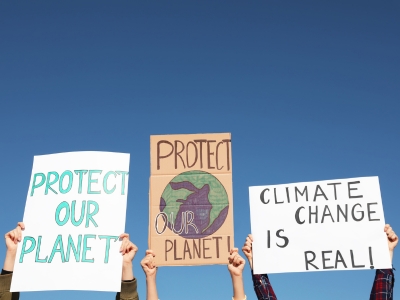
Spring 2025

Moving Ahead in Times of Disruption: Perseverance to Maintain Progress on Climate Change Research
Maricarmen Vizcaino, PhD; Veronica Irvin, PhD; Dahlia Stott - Climate Change and Health SIG
We are living in a unique time in history with dramatic and sudden disruptions to availability of public data, connections with our colleagues at the national (e.g. NIH) and international (e.g. WHO) level, draconian cuts to federal scientific research funding, and targeted work interruption in the areas of climate change and health inequities. Things are evolving rapidly, but some elements remain clear…uncertainty and change.
On January 27, 2025, in response to a series of recent executive orders threatening progress on climate and health, the Medical Society Consortium on Climate and Health and several organizations, including the Society of Behavioral Medicine, expressed their commitment to continue protecting the health of all communities and seek solutions to the climate crisis.1
Climate change impacts health in so many ways and thus is relevant to all behavioral scientists. From public infrastructure, to increasing lung and cardiovascular disease risk, heat-related illnesses, premature mortality, infectious diseases, and mental health. Climate change also widens health disparities affecting low-income communities and communities of color.2-7
Your actions and voices matter now more than ever. We can continue to be part of a collective effort to protect our health, our planet, and the livelihood of future generations. Climate scientists across the world agree that the movement towards clean energy will continue to move forward, and believe that US cities, states, and the private industry will continue to play a significant role in developing initiatives to curb carbon emissions.8 Similarly, as independent researchers, we must persevere and continue pushing science forward despite the limitations that our new times impose upon us.
Suggestions to continue moving forward a climate and health agenda may include:
- Joining the Climate Change and Health SIG – Our group is planning a policy position statement that supports the continuation of work in Climate Change and Health. Reach out to Veronica Irvin at veronica.irvin@oregonstate.edu or join an upcoming SIG meeting to join our writing group.
- Become a data steward – As data on climate change, health, and equity continue to be removed from official sources, consider safely storing databases, reports, and other important documents. Share these resources with the science community and new generations of scientists so that innovative ideas to solve our climate crisis can progress.
- Look for alternative ways to fund your work – Explore funding opportunities provided by local and state governments, industry, non-profit organizations and foundations that support science, to continue your work on climate change, health, and equity.
- Actively contribute to strengthening our scientific community – Engage in an open and respectful dialogue with colleagues across the country and abroad. Support trainees who are just starting to study health and climate change as they navigate this rapidly changing political climate for the first time. International collaborations may become even more important to continuing climate change research.
- Develop innovative solutions to protect the most vulnerable communities and individuals in our population who will experience the most harmful consequences as the US moves away from clean energy. Aim to translate your research findings to your local community by partnering with community organizations.
- Take care of yourself – As an individual being impacted at the personal and professional level by these difficult times, your energy and hope may be compromised. Be proactive in taking time for yourself to pause, reflect, cultivate mindfulness, and strengthen your emotional health.
It may be difficult to foresee what the future may look like in the next few years, and it may be disheartening to think of the consequences future generations may face with the impact of climate change if our progress is halted. Thus, it is critical to recognize how the hard work and dedication we bring to our scientific endeavors impact the lives of many who depend on evidence-based interventions, programs, and policy to combat the detrimental effects of climate change on health.
Save the Date!
Behavior Change Grand Rounds brought to you by the PA SIG and CCH SIG-Integrating climate change into behavioral medicine research: Lessons from physical activity researchers
May 21, 2025 from 12-1pm ET
Presenters: Maricarmen Vizcaino, PhD; Kevin Lanza, PhD; & Claudio Nigg, PhD
References:
- The Medical Society Consortium on Climate & Health. “A unified statement on protecting health and climate amid new threats,” https://medsocietiesforclimatehealth.org/statements/consortium-statements/a-unified-statement-on-protecting-health-and-climate-amid-new-threats/
- ClimateRX. “Your health in a changing climate,” https://www.climaterx.org/climate-health
- Tiotiu, Angelica I., et al. "Impact of air pollution on asthma outcomes." International journal of environmental research and public health 17.17 (2020): 6212.
- Zhou, Xiaoying, Vanitha Sampath, and Kari C. Nadeau. "Effect of air pollution on asthma." Annals of Allergy, Asthma & Immunology (2024). Tollefson, J., Schiermeier, Q.
- Al-Kindi, Sadeer G., et al. "Environmental determinants of cardiovascular disease: lessons learned from air pollution." Nature Reviews Cardiology 17.10 (2020): 656-672.
- Rajagopalan, Sanjay, Sadeer G. Al-Kindi, and Robert D. Brook. "Air pollution and cardiovascular disease: JACC state-of-the-art review." Journal of the American College of Cardiology 72.17 (2018): 2054-2070.
- Carleton, Tamma, et al. "Valuing the global mortality consequences of climate change accounting for adaptation costs and benefits." The Quarterly Journal of Economics 137.4 (2022): 2037-2105.
- Tollefson, J., Schiermeier, Q. How scientists reacted to the US leaving the Paris climate agreement. Nature (2017). https://doi.org/10.1038/nature.2017.22098